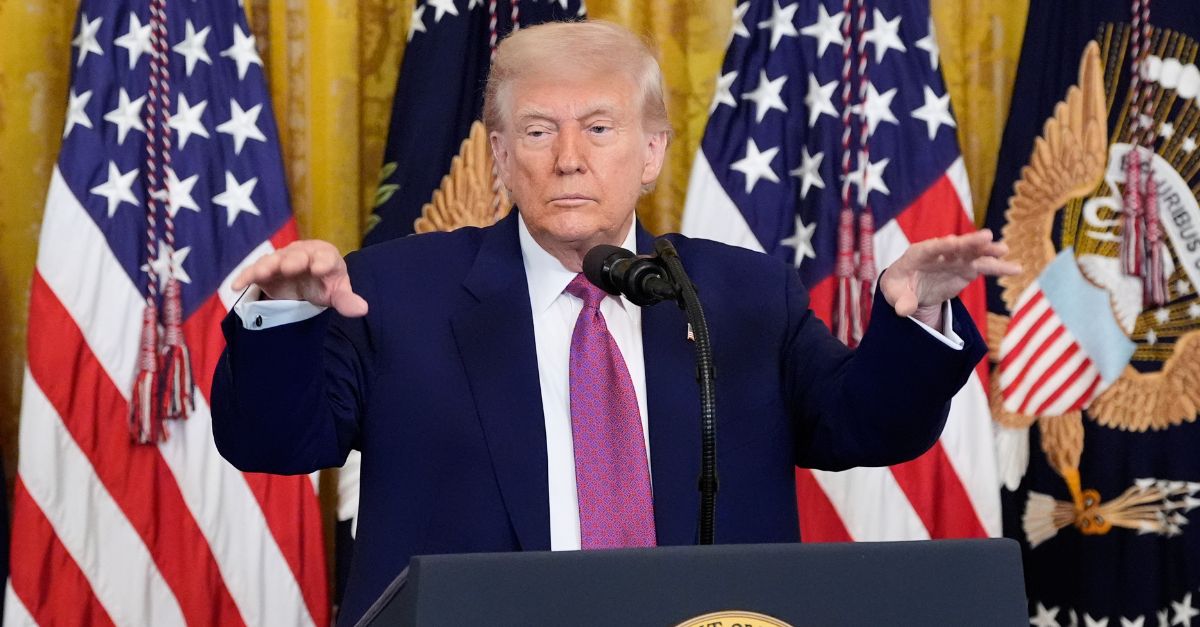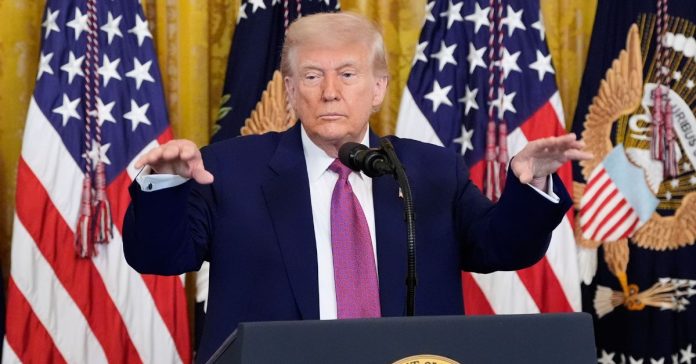
President Donald Trump speaks after signing a bill blocking California”s rule banning the sale of new gas-powered cars by 2035, in the East Room of the White House, Thursday, June 12, 2025, in Washington (AP Photo/Alex Brandon).
The battle over President Donald Trump’s executive order targeting mail-in voting is heating up in a Washington state federal court as two as groups of amici curiae, or friends of the court, on Monday offered various arguments for both sides in an ongoing lawsuit.
In a 36-page brief in support of the plaintiffs, a bipartisan group of former state election officials argues the Trump administration’s effort to rewrite election rules is an “unlawful” overreach by the federal government into the roles played by states in elections.
“[T]he Executive Order seeks to fundamentally reorder the Constitution’s clear allocation of control over elections,” the amicus brief supporting the states reads. “The President plays no role in election regulation and administration — the Constitution explicitly leaves those tasks to the states and Congress.”
The self-described “former state secretaries of states” make a point to note their history of discord on election rules – so as to highlight the importance of their coming together now on preserving the states’ authority over election administration.
“Although Amici may not always have agreed about what constitutes the best election policies, Amici nonetheless share a common commitment to ensuring that elections are free and fair, and Amici are unified in their understanding of states’ pivotal role in enacting and executing election laws, as set forth in the U.S. Constitution,” the filing goes on.
Love true crime? Sign up for our newsletter, The Law&Crime Docket, to get the latest real-life crime stories delivered right to your inbox.
The filing comes in support of the lawsuit filed by Washington and Oregon, which initially sued for an injunction in April and then followed up with a motion for partial summary judgment in May.
The dispute is over the 45th and 47th president’s Executive Order 14248, titled “Preserving and Protecting the Integrity of American Elections.” The order broadly seeks to reshape how elections are administered in the country by, among other things, purporting to enforce a requirement that all voters prove their citizenship by way of formal documentation and by putting a stop to vote-by-mail systems that count ballots postmarked by, but received after, Election Day.
The first group of amici say the executive order “illegally” arrogates power to the president that has been constitutionally reserved for states.
“Contrary to the federalism and separation of powers principles codified in the Constitution’s Elections and Electors Clauses, the Executive Order would unilaterally coronate the President as the country’s chief election policymaker and administrator,” the pro-plaintiffs brief continues. “To voters, Amici’s successors, and every state legislator in the country, the Executive Order therefore represents an existential threat.”
Earlier this month, the U.S. Department of Justice moved to short-circuit the case in its own favor — by using the different procedural method of a motion to dismiss for lack of jurisdiction and standing.
On Monday, the DOJ also received some motions practice support.
In a 20-page amicus brief, the Republican Party of Arizona and a decades-old conservative nonprofit called RITE PAC — Restoring Integrity and Trust in Elections — argue expressly on the terrain of the proposed citizenship documentation requirement.
The pro-Trump administration filing argues the National Voter Registration Act (NVRA) “certainly permits” the Election Assistance Commission (EAC) “to require documentary proof of citizenship as a prerequisite to registering to vote in federal elections.” And, more broadly, the groups say Trump’s directive “is consistent with and implements Congress’ express objective of confining the franchise to United States citizens and prohibiting the registration of non-citizens.”
To hear the conservative organizations tell it, the NVRA is just one of many federal laws that concern voting in federal elections. And, while the statute itself may not have much of anything to say about citizenship documentation, several others do — and those statutes clearly limit the franchise to citizens. Therefore, the brief argues, reading a citizenship requirement into the NVRA is not out of the ordinary — and is both legally and constitutionally permissible.
The pro-defense filing goes on, at length:
A rigid reading of the NVRA that requires registration agencies to blindly offer registration applications to noncitizens, especially when agency officials will frequently have information at their disposal that indicate a would-be applicant’s non-citizenship status, is at odds with numerous federal laws that prohibit non-citizen registration, protect non-citizens from being solicited to register to vote, and place those who offer registration applications to known non-citizens in potential legal jeopardy. It would also be inconsistent with Congress’ stated purpose of registering only “citizens” to vote and protecting election integrity.
Meanwhile, the pro-plaintiffs filing takes a more bird’s-eye view of the situation — largely striking notes about “executive overreach.”
“The Elections Clause and numerous federal statutes designate states a crucial part of enacting and administering federal elections,” the brief reads. “The President cannot use the Executive Order to crop states out of this picture, just as he cannot superimpose himself in.”
Such overreach, the former election officials say, is unconstitutional, in violation of federal law, contradicts court precedents and existing case law, violates longstanding U.S. traditions, and is a danger to both the lesser function of state election officials and broader democracy writ large.
From the pro-states filing, at length:
[I]f the Court does not grant Plaintiffs’ targeted request to enjoin some of the most onerous portions of the Executive Order now, the snowball of executive overreach will grow swiftly and exponentially. And then it is only a matter of time until the regime created by the Elections and Electors Clauses is buried under an avalanche of Presidential power — “an accumulation that would pose an inherent ‘threat to liberty.'” The Court should not countenance the Executive Order’s attempted unconstitutional power grab by the President.

